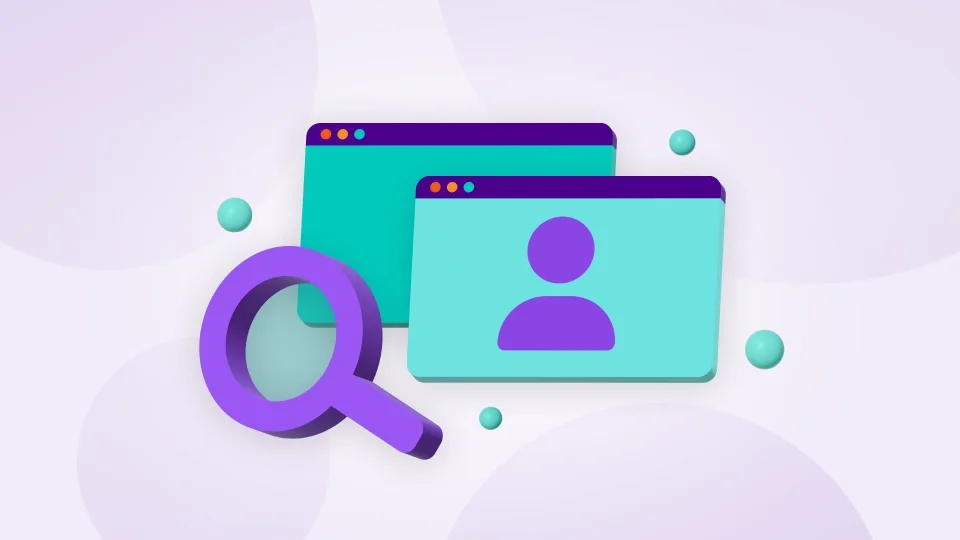Table of contents
Your organization’s ability to ensure a great employee experience impacts turnover, retention, and performance. But building an experience that all team members want to be a part of can feel like aiming at a moving target, as each employee has distinct expectations and concerns when it comes to their experience in the workforce. Enter employee experience platforms, which eliminate much of the guesswork and empower organizations to better connect with, listen to, recognize, and reward team members in ways that actually make an impact.
In this guide, you’ll discover what to look for in an employee experience platform and find a detailed overview of the top employee experience platforms of 2025. You’ll then have all the information you need to confidently choose the tool that will elevate employee experience at your business.
What is an employee experience platform?
An employee experience platform is software that improves the most important aspects of employees’ work lives. Modern employee experience solutions are flexible in how they meet the needs of users, helping HR teams and leaders more readily identify and meet the specific needs of their workforce.
While there are countless tools out there that claim to boost the employee experience, a real employee experience platform addresses multiple, key parts of the work experience, from receiving and giving appreciation, to empowering team members to voice their real thoughts, to fostering strong connections between colleagues. By properly managing the employee experience with a feature-rich platform, you can ensure every employee has a positive, mutually satisfying time at your company.
Benefits of employee experience software
If you’re wondering whether or not employee experience software is worth the investment for your organization, take a closer look at just some of the benefits implementing the right tool can bring:
- Employee engagement: Engaged employees stay with organizations longer and are motivated to give their best effort on a daily basis, boosting productivity across your company. The best employee experience platforms help people leaders gather and analyze workforce data, so they can identify the major drivers of engagement for their workforce and quickly act to make meaningful improvements that bolster engagement.
- Employee recognition: Although employee recognition is the primary driver of an engaged, motivated workforce, many organizations fail to prioritize this crucial part of the employee experience. Employee experience software helps your business consistently show appreciation to its employees, so they never doubt that their efforts are noticed and valued.
- Data-driven insights: When it comes to crafting an employee experience that packs a punch, data is king. After all, it’s difficult — if not impossible — to know where to start, what’s working, and what’s not if you don’t have reliable information on your workforce’s needs and preferences. Your employee experience platform should help you gain real-time insights into your employees’ motivations and challenges and allow you to measure the impact of actions you take to address them.
- Positive company culture: Employees today want more than just a paycheck — they’re looking for an organizational culture that makes them feel like they truly belong. Employee experience software empowers businesses to create a culture that encourages employee well-being and loyalty with tools that give employees a voice and enable transparent communication.
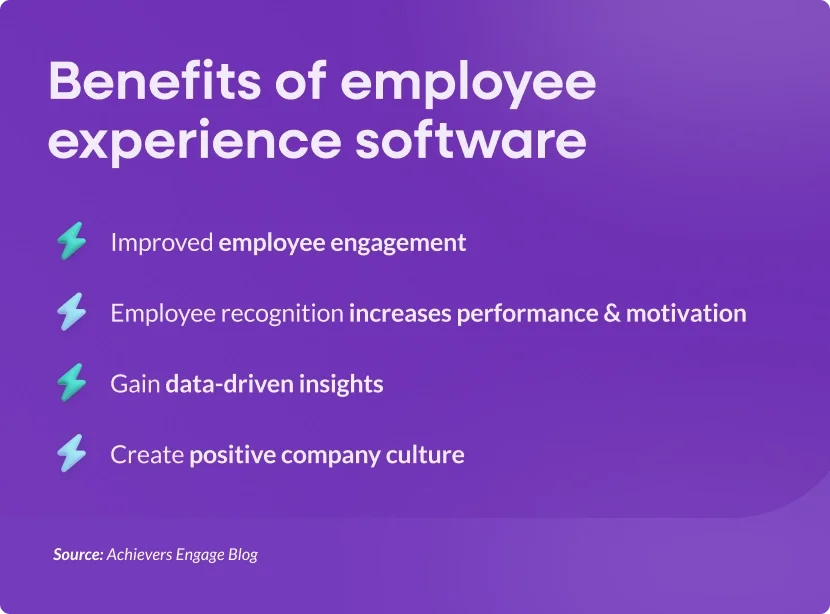
While the right platform can help you build and sustain an exceptional employee experience, it’s important to remember that not all tools are created equally. Solutions that address only one part of the employee experience — or those that treat employee experience as a secondary concern — won’t deliver the results you’re looking for. That’s why it’s so important to thoroughly evaluate your options before committing to a solution.
What to look for in an employee experience platform
Many workforce tools claim to offer features that boost the employee experience, but it’s important to know which capabilities are non-negotiable when it comes to enhancing your employee experience initiatives. Look for a platform with these key features:
- Scalable: Ideally, your business won’t remain stagnant over the coming months and years, so it’s crucial to invest in software that will grow as your company does — and even make that growth a little easier on employees. Make sure you select a system that offers robust and scalable solutions that can accommodate your organization as it evolves.
- Customizable: No two companies, teams, or individual employees are exactly alike, so don’t waste your time and resources on a platform that promises one-size-fits-all success. Your employee experience platform should instead make it easy to customize key features — like feedback channels, recognition programs, and reward offerings — so your unique workforce will get the most out of your chosen tool.
- Easy to use and intuitive: There’s no point investing in tools that your employees won’t use, so make sure the one you land on is user-friendly with high adoption rates. Bonus points if the platform is holistic enough to act as a centralized hub for all things employee experience, rather than a clunky solution with disparate, unintegrated tools that throw a wrench in worker productivity.
- Recognition and rewards: Recognition and rewards should already be a key part of your employee experience strategy. When they’re recognized for a specific action, they’re more likely to repeat that behavior in the future. The right employee experience platform should make showing appreciation easy, regardless of when or where team members work, and include a points-based rewards system that lets every team member give and receive merchandize and experiences they actually want.
- Employee feedback features: Creating an excellent employee experience isn’t a one-and-done task. It’s an ongoing process that should be enhanced and updated based on employee feedback. After all, the employee experience should aim to double down on what’s working for employees and eliminate what’s not. Choose a platform that includes anonymous, easy-to-use feedback channels that are readily available any time employees have something they want to share.
- Integration capabilitiese: Disconnected systems make it difficult for users to toggle between tools as they complete their daily work, so look for a platform that integrates with your existing tech stack. Prioritize integrations with other key HR systems and the productivity and communication tools your workforce relies on to get the job done.
- Compliant and secure: To protect user and business data, meet industry standards, and avoid legal and financial penalties, your employee experience platform provider needs to prioritize security and compliance. Find a solutions partner that is committed to helping your organization reach its goals safely and effectively.
Above all, it’s vital to choose a platform that’s backed by workplace science and robust research. Mastering the employee experience shouldn’t be a shot in the dark, so make sure the solution you rely on is rooted in tangible, data-driven insights.
7 best employee experience platforms
While “best” can be a bit subjective, depending on your organization’s goals, resources, and other constraints, there are several popular employee experience platforms that stand out. Here are seven of the top employee experience solutions on the market today.
1. Achievers
The Achievers Employee Experience Platform is a popular employee experience solution that includes all the features needed to help businesses meet and exceed the ever-changing goals of their workforce. It offers capabilities that hit all the key aspects of the employee experience: recognition, engagement, and communication. Achievers’ suite of tools are grounded in workplace science that makes it easier than ever to turn workforce insights into meaningful action.
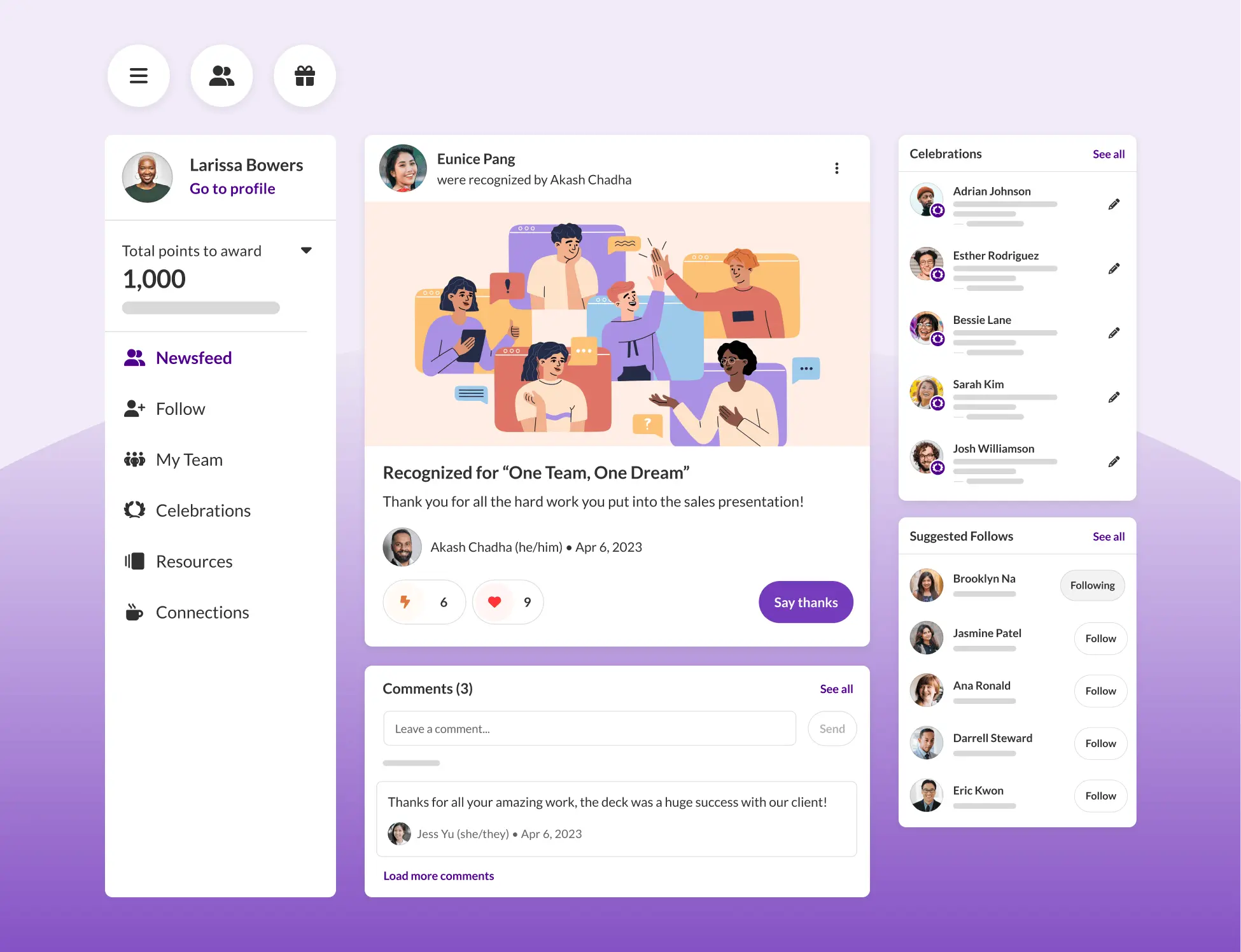
The Achievers advantage
- Effective, user-friendly tools for employee recognition and rewards to boost engagement
- Analytics and insights provide a deep understanding of employee sentiment and engagement, guiding leaders from insight to action
- Integration with existing HR systems and common workplace tools to reduce friction and improve adoption rates
- Accessibility across desktop and mobile devices
Key features of Achievers
Achievers Recognize fosters a culture of gratitude and motivation, with tools and interactive feeds that make it easy to acknowledge accomplishments and milestones — both big and small. Team members can share appreciation whenever the urge strikes them in a digital public square, where other employees can then see and join in on the recognition with comments and messages of their own. Rather than promoting one-size-fits-all rewards, Achievers uses a points-based rewards system that allows employees to accumulate points over time and redeem them for rewards they actually want.
With Achievers Listen, employees can take advantage of accessible, confidential feedback channels — like pulse surveys and intelligent, proactive HR chatbots — to ensure that they always feel heard. Managers and other leaders can then turn to Achievers’ built-in reporting and analytics features to get a picture of what’s holding experience back at a glance. Action planning capabilities empower them to act collaboratively with their team members to quickly tackle issues before they can impact the employee experience.
And to make sure that every employee feels like they belong, organizations can turn to Achievers Connect. It pairs employees who may otherwise never meet for virtual conversations to promote communication, collaboration, and coaching.
Final thoughts on Achievers
Scientifically designed to meet the most important needs of any workforce, Achievers is the most comprehensive employee experience on the market. Unlike less extensive systems, the Achievers Employee Experience Platform provides people leaders with everything they need to develop a best-in-class employee experience that entices top talent to join and remain loyal to their organization.
2. Culture Amp
Culture Amp’s employee experience platform uses predictive people analytics to help users better understand and manage the employee experience. Their performance summary and retention insights let businesses closely track and measure employee performance to predict turnover and retention rates moving forward.
The platform — which integrates with existing people data — can help teams surface insights around the employee experience, then make changes that contribute to satisfaction, engagement, and retention. AI-powered comment summaries help leaders understand the topics that matter most to their people, which saves time and accelerates decision making.
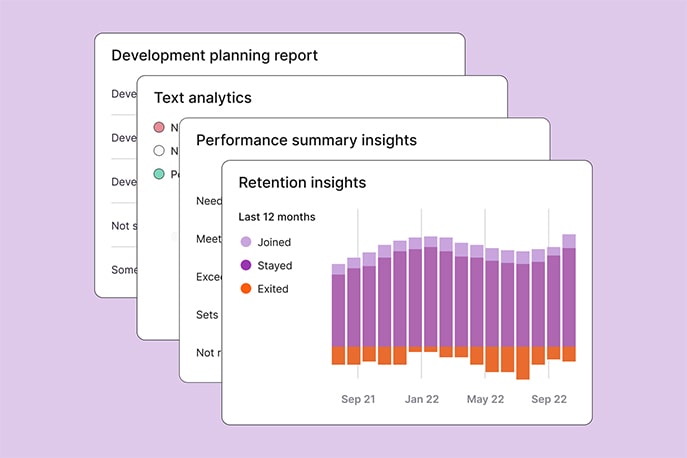
Pros
- Real-time visibility into how employees feel and what works for them
- Warning signals for employee turnover to course-correct before it’s too late
- Integration with existing HR systems and data
Cons
- Can be difficult for users to navigate, which may lead to lower rates of adoption
- Customization of features requires additional in-depth training
- Integrations between surveys and performance reviews may be cumbersome, which can make one-on-one discussions less efficient
Key features
Culture Amp focuses on performance and engagement as the two primary drivers of a great employee experience with their People Analytics feature, which uncovers key insights around company culture. Retention Insights take the data to the next level by breaking down likely turnover percentages alongside potential key factors for people leaving.
Their partner ecosystem helps pull everything together, as users can integrate the Culture Amp platform with other existing tools. Customizable goal-setting and tracking also helps keep employees on task.
Final thoughts
Culture Amp can help organizations that struggle to understand why their top talent often jumps ship. Because it provides real-time alerts for potential turnover, users can more readily identify at-risk employees and intervene using those actionable insights.
It may not be the right fit, however, for businesses who lack extra resources for training on feature customization or reporting. Accessibility for non-expert users can be challenging with this tool, so desired adoption rates and in-depth training availability should be taken into consideration.
3. Lattice
Lattice prioritizes each stage of the employee lifecycle with tools that support onboarding, performance management, and payroll in a single, centralized system. The software lets users set goals, send and receive feedback, and conduct performance reviews, all while tracking progress. With Lattice, employees can see how their daily work connects to overarching goals, which helps them better visualize their team and company impact. Real-time data enables managers to have relevant one-on-one discussions with team members and improve outcomes.
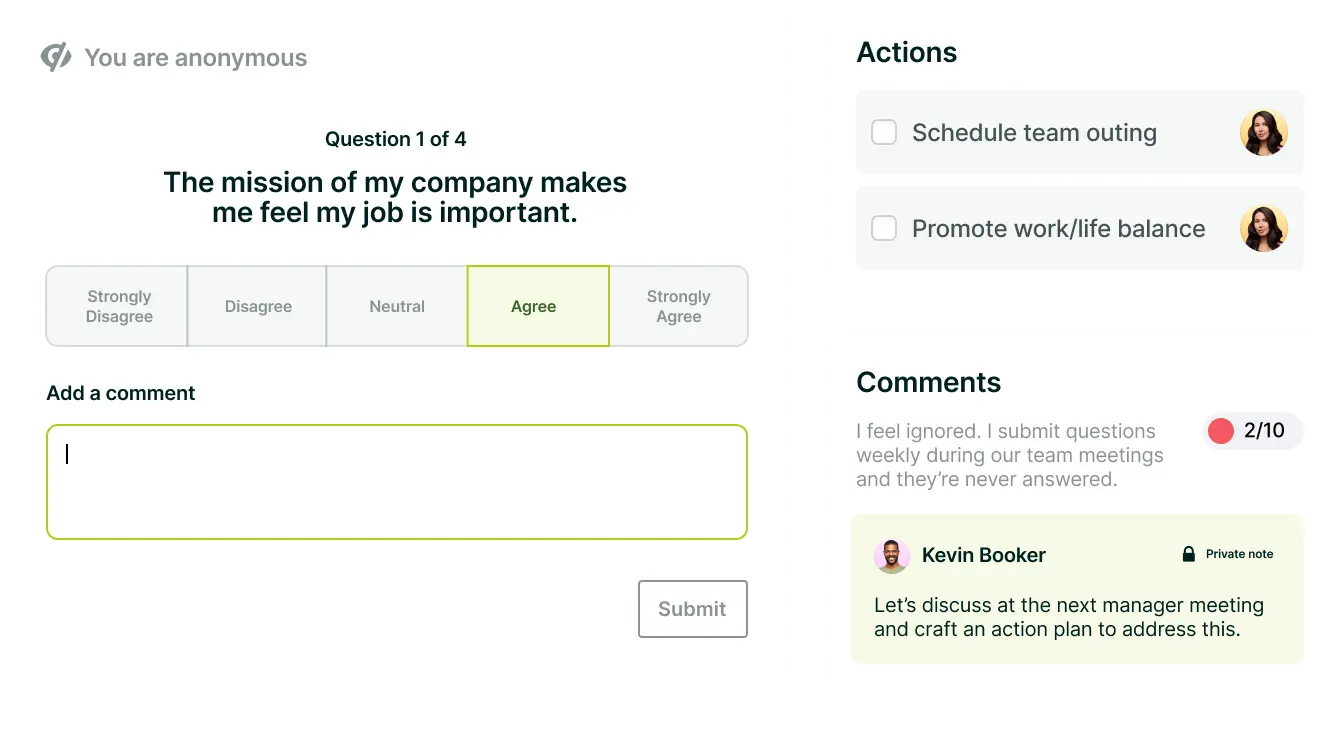
Pros
- Objectives and key results (OKR) tracking system to monitor progress and connect goals with business objectives
- Real time data on how employees feel
- Insights throughout the employee lifecycle
Cons
- On the pricier end of the spectrum, with additional costs required for setup and support
- Limited third-party integrations
- Heavily focused on performance management rather than company culture or employee experience
- May require manual data management
Key features
Lattice AI analyzes both employee survey results and open-ended feedback. The platform’s features primarily focus on ensuring individuals’ performance corresponds with larger organizational goals through ongoing feedback channels, OKR tracking, and customizable review cycles.
Onboarding and exit surveys bookend employment and help teams improve retention rates without missing a beat. Lattice also boasts a structured one-on-one meeting tool that supports more effective and efficient discussions through collaborative agendas, note taking, and progress tracking.
Final thoughts
Lattice can assist companies looking to build stronger ties between employee performance and larger organizational goals. The platform leverages OKRs and real-time feedback to help employees stay on track and aligned with business priorities.
4. Qualtrics XM
Qualtrics XM offers three products aimed at managing the employee experience: People Engage, Lifecycle, and Analytics. Employee-led feedback channels, proactive problem solving tools, automated workflows, and in-depth data analysis help companies develop employee experience strategies. Qualtrics XM helps organizations track worker needs as they change in real-time, using predictive analytics to forecast performance and behavior.
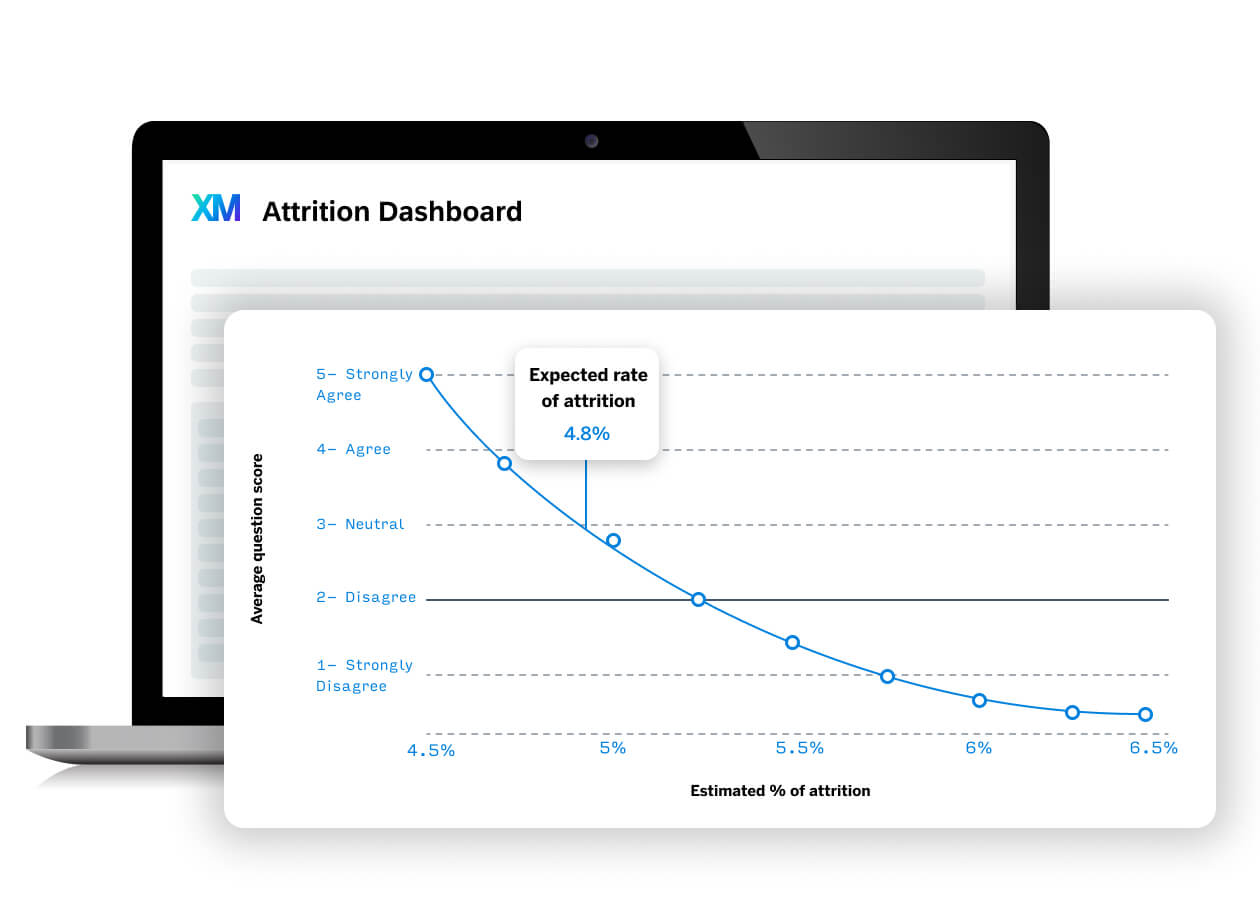
Pros
- Advanced employee experience analytics for proactive problem solving
- Automated actions for frontline employees to improve both customer and employee experiences
- Integrations with existing systems
Cons
- Surveys can be complex to build
- Reporting tools are suitable for beginners but aren’t quite as powerful as some competitors’ offerings
Key features
People Engage helps users measure the employee experience across hundreds of benchmarks and provides personalized insights and recommendations. With People Lifecycle, leaders can start soliciting feedback from the candidate stage on. Finally, People Analytics leverages AI to determine which pieces of the employee experience puzzle contribute to positive customer outcomes.
Final thoughts
Qualtrics XM’s customer experience features make it a potential fit for organizations that want to address clients’ needs along with employee concerns.
5. Motivosity
Motivosity includes tools for recognizing employees, improving communication, and soliciting feedback. It helps teams to automate and streamline recognition programs and allows employees at every level to participate in recognition.
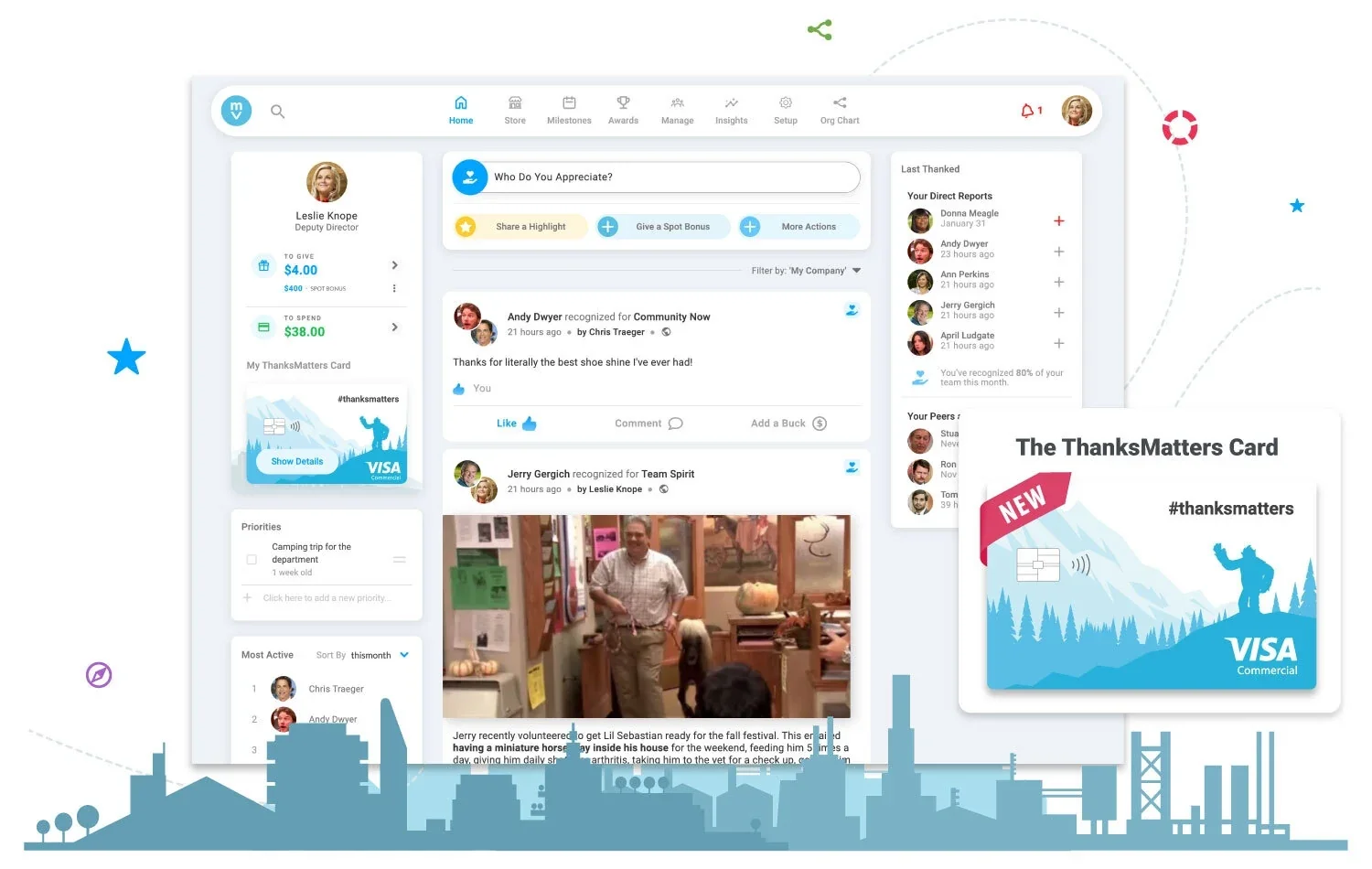
Pros
- Can be used by employees at every level
- Peer-to-peer recognition capabilities
- Customizable rewards system
Cons
- High dependency on third-party apps
- Potentially complex implementation process
Key features
The Motivosity platform facilitates recognition between team members and includes reward features as well. Feedback capabilities include pulse surveys, an employee NPS (eNPS) survey, and analytics tools. It also features a social feed where employees can connect, a centralized location for workplace communication, and the ability to schedule posts on the company feed in advance.
Final thoughts
Motivosity offers a substantial suite of recognition and rewards features along with some tools for capturing and analyzing employee input. Its communication features may be redundant for organizations that have already adopted other common workplace tools.
6. 15Five
15Five is a performance management platform that assists with measuring and acting on performance and engagement data. AI-powered tools help to automate administrative tasks that can impact managers’ ability to build relationships with employees. The platform includes an insights dashboard to help users determine where they should focus their efforts for greater impact.
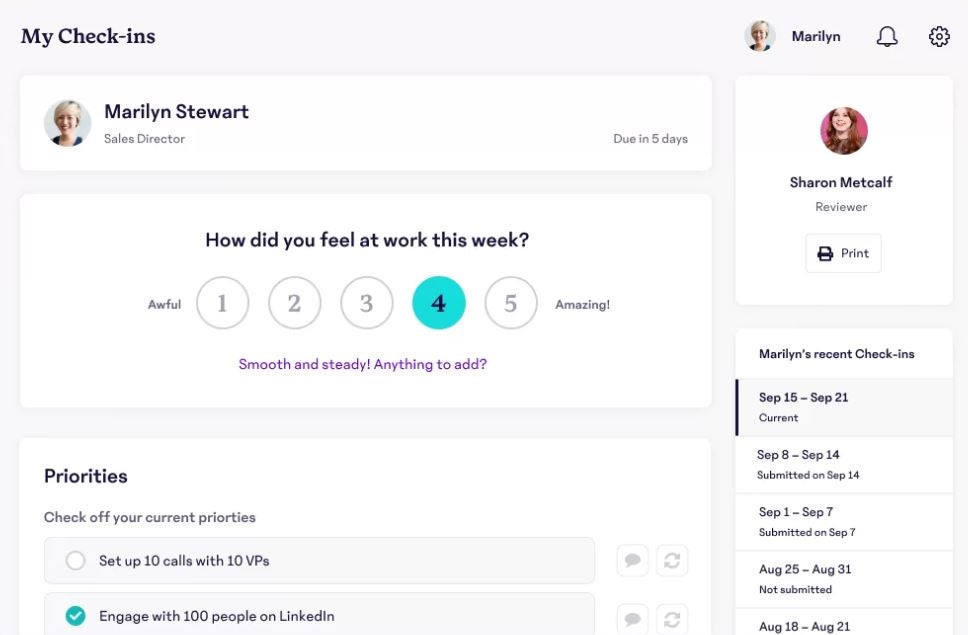
Pros
- Performance management capabilities
- Structured weekly check-ins
- Public peer-to-peer recognition
Cons
- Users may have difficulty with the communication features on the platform
- Lack of recognition and rewards tools
Key features
15Five’s performance management functionalities include review cycles, standardized review evaluations, calibrated ratings and reports, and analytics. Users can tailor the tool to fit their company’s needs and can use AI to generate reviews based on collected data. Employee engagement surveys are customizable surveys and measure changes over time to determine what contributes to engagement. The Transform feature offers on-demand training, AI assistance, and live coaching for managers looking to close their skill gaps and connect with their teams. The influence of each of these features can be measured with the HR Outcomes Dashboard, which connects performance management, engagement levels, and more.
Final thoughts
15Five may make sense for companies that are primarily focused on performance management, with only a secondary focus on other key drivers of the employee experience.
7. Bonusly
Bonusly is employee recognition software that helps teams acknowledge employee wins. It also features tools for analyzing recognition trends and improving performance management through goal-tracking and more effective check-ins.
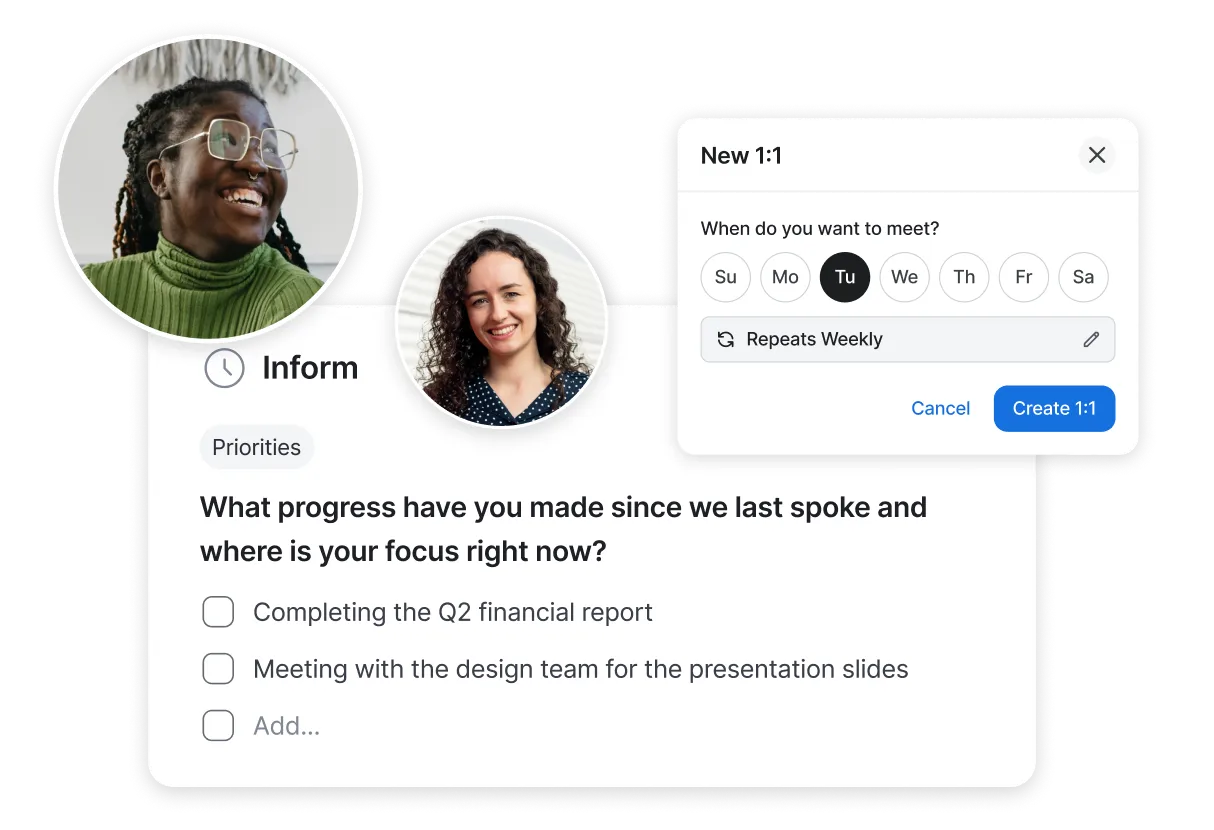
Pros
- Allows employees to redeem points for various rewards, depending on their preferences
- Automatic rewards allowance
- Relatively low administrative overhead
Cons
- Limited analytics may not be adequate for businesses who want deeper insights that go beyond recognition
- Less comprehensive feature set than other, more holistic employee experience platforms
Key features
Bonusly’s recognition capabilities help teams celebrate one another’s accomplishments and milestones. Its performance tools improve manager effectiveness with features for one-on-ones and collecting feedback. Bonusly’s rewards features include a catalog of swag, gift cards, and more for workers. Teams can also glean Insights into performance and recognition trends using dashboards that highlight participation rates, peer-to-peer connections, and patterns.
Final thoughts
Bonusly focuses heavily on the recognition aspect of the employee experience, but may not be a fit for organizations that are looking to make an impact on the other major drivers of engagement.
Examples of successful employee experience initiatives
If you’ve ever tried to improve employee experience at your organization, you likely know just how difficult a feat it can be. But with the right strategy and software, getting it right doesn’t have to be a pipe dream. Here are a few examples of businesses that have been successful in their attempts to enhance the employee experience.
Meijer
Meijer, a family-owned, Midwest-based superstore, wanted to find ways to show employees their appreciation for all their hard work, as they knew frequent praise would boost the employee experience. But without the proper tools for support, they lacked a structured, reliable method for recognizing and rewarding team members for their daily contributions.
After implementing Achievers, Meijer has built a positive culture of recognition. Armed with their new tools, they were able to uncover key data that linked recognition frequency rates to turnover. They developed a winning employee experience by leveraging the platform alongside best practices for greater recognition.
GM
General Motors (GM) is a global automotive enterprise whose vision for zero crashes, zero emissions, and zero congestion required a diverse, inclusive workforce with unique perspectives and amplified voices. But fostering that kind of culture seemed impossible without intelligent tools to overcome the challenges associated with globally dispersed teams.
With Achievers, GM was able to better connect with and engage employees from every background and create a sense of belonging and inclusivity. Their Achievers-powered recognition program has delighted employees and brought a small business feel to their large enterprise, resulting in an enviable employee experience.
Discover
U.S. financial services brand Discover needed a reliable way to ensure a great employee experience for its all employees — especially for those in customer-facing roles. They wanted to deliver an improved customer experience with an engaged workforce, but they needed a tool to support their efforts.
Discover created a recognition and rewards program using the Achievers Experience Platform that reached over 17,000 global employees. The solution empowered their managers with the ability to better recognize their team members, deliver meaningful rewards, and drive a better employee experience.
What’s the top employee experience platform?
Understanding your organization’s current employee experience — and all of its individual contributing factors — is the first step in crafting a reliable strategy that improves retention and facilitates better business outcomes. But that deep understanding requires an employee experience platform that lets your leaders uncover key insights into how to better connect with, engage, and recognize workers moving forward.
The Achievers Employee Experience Platform is the quickest way to develop a winning employee experience at your company. It offers everything your enterprise needs to make employee experience a driver of business success, backed by 24/7 support from a team of experts.
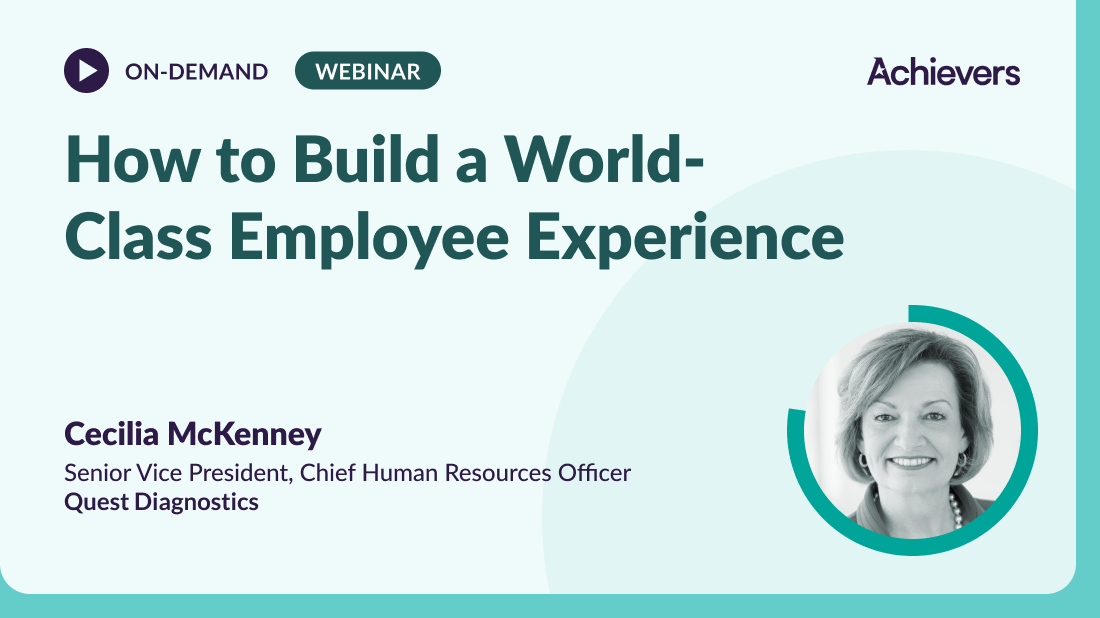
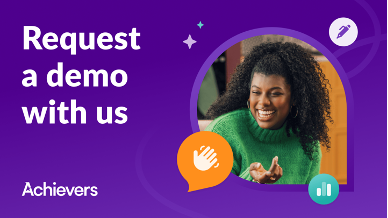
FAQs
Key insights
- Employee experience platforms drive engagement, recognition, and performance through data-driven insights and feedback.
- Key features to look for in a platform include scalability, customizability, recognition and rewards tools, and real-time feedback capabilities to ensure ongoing improvement.
- Achievers stands out by offering a comprehensive, scientifically-backed platform that integrates recognition, engagement, and communication to reinforce valuable behaviors.
